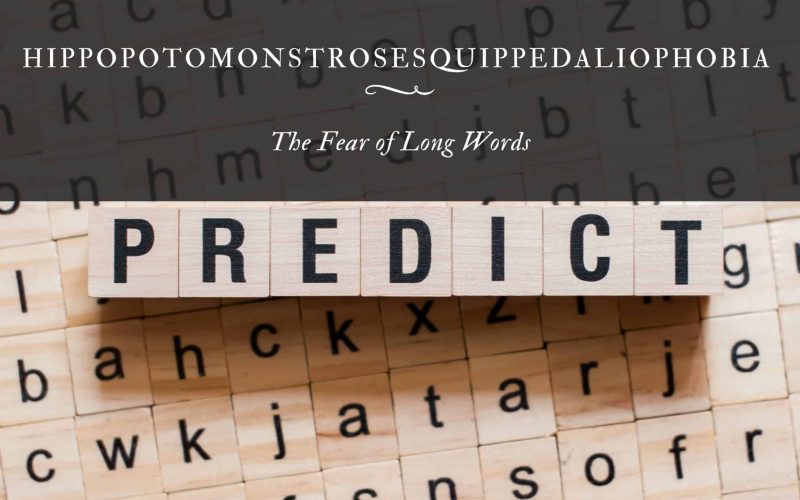Is this a common phobia? Hippopotomonstrosesquippedaliophobia is one of the longest words you will ever find in the dictionary — and, ironically, is the name for an intense fear of long words.
Another name for this phobia that may be easier to pronounce is Sesquipedalophobia. The American Psychiatric Association, at present, doesn’t recognize this phobia officially.
Instead, hippopotomonstrosesquippedaliophobia is referred to as a social phobia.
According to the most recent edition of the Diagnostic and Statistical Manual of Mental Disorders (DSM-5), the definition of social phobias is specifically outlined.
Medical professionals make use of the DSM-5 to make diagnoses for phobias and certain mental health conditions.
Some of the criteria for diagnosing According to the DSM-5 must include:
- intense fear or anxiety about social situations where a person may get examined, like meeting a new person or having a conversation
- the fear or anxiety is not proportionate to the social situation
- the fear or anxiety is persistent, and the social situation is deliberately avoided
- the anxiety, fear, or avoidance of trigger situations causes clinical distress
Quickly discuss with your doctor if you feel like you may be dealing with social phobia. The doctor will make sure that there are not any underlying conditions that may cause anxiety or fear, such as panic disorder.
What Are the Symptoms of Hippopotomonstrosesquippedaliophobia?
Symptoms of Hippopotomonstrosesquippedaliophobia may be triggered when a person hears or sees a long word, such as “Hippopotomonstrosesquippedaliophobia” or “antidisestablishmentarianism.”
This can cause a person with a fear of long words to feel a great deal of anxiety, discomfort, or fear.
They may also skip reading or trying to pronounce the word so they don’t have to deal with lengthy words that’ll cause them to become afraid or panic.
According to anecdotal evidence, the fear of long words can cause embarrassment or feelings of being laughed at or mocked when pronouncing or trying to read long words.
Other physical symptoms can include;
- Trembling
- Sweating
- Dizziness
- Fainting
- Dry mouth
- Headache
- Trouble breathing
- Avoiding reading because of your fear
- Feeling distressed over academics or work involving long words
There are also certain general phobia symptoms that a person with a fear of words could watch out for, including:
- Being aware that your fear of words is unreasonable but feeling completely powerless to control it
- Unable to function in your daily activities as you normally would because of your fear
- Feeling nauseated
Causes of fear of long words include;
- An associated negative event from the past: For example, a person who had a challenging time learning how to spell or pronounce words as a child may panic whenever they come across a long word. Their difficulty with learning words as a child could be a scary, traumatic time for them.
- Genetic factor: People who have a family history of specific phobias, anxiety, or other mental health conditions may also have a higher chance of suffering the same kind of phobia.
- Environmental factor: This phobia may also be caused by learned behavior, such as hearing stories or watching videos about negative experiences fear of long words or traumatic experiences related to it.
- Brain function: The Mayo Clinic has reasons to believe that changes in a person’s brain activity may also determine whether or not the person develops a certain phobia.
How is It Diagnosed?
Generally, there is no laboratory test for the diagnosis of phobias and certain mental health conditions. Individuals who have this phobia will most likely never consider getting medical help.
The most likely action people with the phobia take is to presumably take jobs that won’t expose them to long words and phrases.
However, if the symptoms of this phobia become unbearable, or other symptoms show up, your doctor or therapist will ask you a series of questions about the symptoms you have, to determine if you have an anxiety disorder or a phobia. They’ll also review your medical, psychiatric, family, and social history.
Since medical and mental health associations do not officially recognize hippopotomonstrosesquippedaliophobia as a phobia, this fear technically is not a diagnosable condition.
However, your therapist or doctor may be able to give general information about common phobias and recommend treatment.
What Treatment Options Are Available?
In general, there are many different ways a phobia can be treated. Exposure therapy is the most effective and common form of phobia treatment.
This method of psychotherapy helps to change a person’s response to the situation, object, or word that triggers fear and anxiety.
Cognitive-behavioral therapy (CBT) is also a common treatment method that is used to manage or cure a phobia.
With CBT, there is a blend of exposure therapy with other therapeutic methods to help a person cope with anxiety. CBT will also help to limit any overwhelming ideas or thoughts.
Medications have also been known to help manage a wide variety of anxiety disorders. However, there is no information on the effectiveness of medicines in treating this particular phobia.
Other treatment options that may be of help include;
- Talk therapy with a psychiatrist, counselor, or social worker
- Mindfulness strategies such as mindful breathing, listening, and observation to help you cope with anxiety
- Attending a support group to connect with other people facing the same or similar phobia
You could also manage your phobia symptoms by making specific lifestyle changes, such as:
- Getting enough sleep each night
- Eating a healthy and balanced diet
- Cutting out substances that can make anxiety worse, like caffeine
- Facing fearful and anxiety-inducing situations head-on, as often as possible
When confronted with long words, a person with this phobia may also find it helpful to:
Substitute long words with shorter ones, like saying fridge instead of a refrigerator.
Break words down into syllables. For example, reading a word like “semiautobiographical” would be better to read it as sem-i-au-to-bi-o-gra-phi-cal instead of pronouncing it all at once.
As mentioned earlier, this phobia isn’t common, so you may not get an accurate diagnosis.
However, if you feel like you have a phobia for long words, it is best to talk to your close relatives and friends about it and talk to a doctor who may be helpful.








